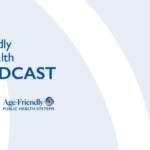Public Health’s Roles in Supporting Informal and Family Caregiving
As the population ages, the critical role of family and informal caregivers will continue to grow and needs support.
(Washington, DC – September 30, 2025) – As the percentage of older adults continues to grow in the United States, so do the number of people providing informal caregiving to them. A new policy brief, Public Health’s Roles in Supporting Informal and Family Caregivers, finds that many people who provide unpaid, informal caregiving are experiencing increasing levels of economic, emotional, and physical hardships as a result. This brief, developed by TFAH’s Age-Friendly Public Health Systems initiative, highlights the role that public health agencies can play in supporting caregivers and that more federal and state interventions are needed to support this growing segment of the population.
Public Health’s Roles in Supporting Informal and Family Caregivers notes that 41.8 million people served as a caregiver to an adult over the age of 50 in 2020, an increase of over 7 million people who provided unpaid care to a family member or friend in 2015. Nearly one in five caregivers of adults experience high levels of financial strain. Nearly all caregivers have had to miss work or reduce their work hours.
TFAH’s Age-Friendly Public Health Systems (AFPHS) provides guidance for public health practitioners on the policy and systems changes that are needed to advance healthy aging and build supportive communities. This includes programs and activities that support caregivers, including better availability and easier navigation of caregivers supports.
The brief provides recommendations for the roles of public health that are aligned with the AFPHS 6Cs Framework, including:
- Advocate for changes to the workplace to create supports for caregivers including leave policies and employment protections.
- Help create cross sector initiatives that support older adult and caregiver needs.
- Work with the healthcare sector to ensure that healthcare providers understand and can refer caregivers to non-clinical support resources in their communities.
- Collect data on the experience of caregivers and help communities design programs that meet their needs.
- Model the use of culturally appropriate communication strategies that recognize the diversity of the caregiving population.
- Create programs that provide caregivers with the tools they need to care for themselves and their care recipients.

